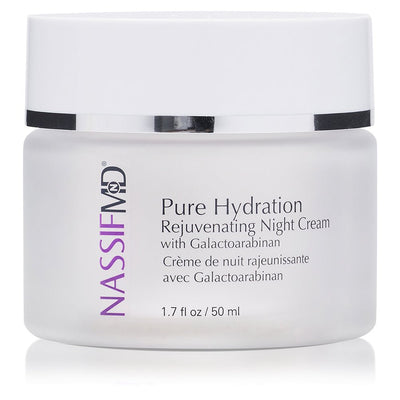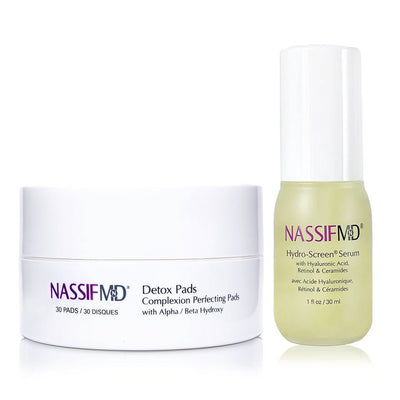Understanding Skin Types: What’s Yours?
Your skin type is an essential factor in building an effective skincare routine. Understanding your skin type helps you better care for your skin by choosing the most beneficial skincare products.
You likely already have an idea whether your skin is oily, dry, combination, or falls into another category. But if you’ve ever wondered what is my skin type? Today’s article is for you.
Keep reading as we dive into skin types, how to determine yours, and skincare tips for each type. This article will cover:
- The five primary skin types
- What is combination skin?
- How do I know what my skin type is?
- Best products for each skin type
Let’s get started!
The Five Primary Skin Types
Everyone has unique skin, but understanding your primary type is essential for establishing an effective skincare routine that hydrates, nourishes, exfoliates, and protects the skin over time.
Let’s look at the five primary skin types in more detail – oily, dry, sensitive, normal, and combination.
Oily Skin
People with oily skin have skin cells that produce excess sebum, the skin’s natural oil. Because of the increased oil production, the skin can appear shiny or greasy.
More oil can also contribute to acne-prone skin. Extra oil can clog pores, contributing to blackheads and acne. You may also notice more prominent, more visible pores.
Skincare tip: Oily skin doesn’t need more oil but still needs hydration. Choose oil-free, water-based products, and make sure to exfoliate regularly.
Dry Skin
On the other end of the spectrum, from oily skin is dry skin. Dry skin doesn’t produce enough sebum and can appear dull and exacerbate the appearance of fine lines and wrinkles. Very dry skin can peel or crack.
It’s important to note that dry skin is fundamentally a lack of oil, not water. Skin that is low in water is dehydrated, and dehydration can affect any skin type.
Skincare tip: Focus on repairing the skin barrier to lock in moisture and natural oils. Consider hyaluronic acid to hydrate along with an emollient moisturizer. Products that contain oil, such as lotions, creams, and balms, are beneficial for dry skin.
Sensitive Skin
Those with sensitive skin may have more skin irritation and may be more prone to eczema and sunburn. They also tend to be sensitive to chemicals, including chemicals in skincare products. Sensitive skin may react with visible signs like redness, itching, and discomfort.
Those with sensitive skin require mild and gentle skincare formulas.
Skincare tip: focus on building the body’s natural defenses and resilience by supporting the skin barrier. Always spot-test new skincare products to ensure tolerance before applying to the whole face or body.
Normal Skin
Those with the normal skin type tend to have balanced skin and balanced sebum production. They tend to have firm skin with few skin concerns and breakouts. In addition, normal skin tends to tolerate many different skincare products.
Skincare tip: Don’t neglect your skin because you don’t have any issues now. Continue to prioritize skin health to prevent future problems and maintain balance.
Combination Skin
Many people don’t solely fit into one skin type category. Combination skin displays at least two skin types in different areas. A common combination is oily and dry skin. For example, you might show oily skin and shine in the T-zone area (forehead, nose, and chin) but have dry cheeks. Another example is oily skin, that is also sensitive.
Tips for skincare: Choose gentle products designed for multiple skin types. Incorporate spot treatments into your skincare routine. (add link to steps in skincare routine article)
How Do I Know What My Skin Type Is?
Based on these general descriptions and knowing how your skin operates in the world, you likely have a good sense of what your skin type is by now.
Because your skin type essentially has to do with the amount of sebum your skin produces, you can check sebum levels at home in two ways:
- Watch and wait method: Wash your face and pat it dry without applying skincare products. Then, wait 30 minutes and check for oil production. If your skin is oily, you likely have oily skin. If your skin feels tight and dry, you likely have dry skin (or are dehydrated). If you notice the shine only on your T-zone, then combination, and if your skin feels great, then you likely have normal skin.
- Blotting method: Wash your face and pat it dry without applying skincare products. Then, wait 30 minutes and check for oil production using blotting sheets. The amount of oil on the blotting sheets will give you a sense of your skin’s oil production. Normal skin will have minimal oil production throughout.
Skin Types Can Change Over Time
Your skin was different as a teenager, compared to your 20s and 30s. And will likely change again in midlife when skin gets dryer, especially for women. Your environment can also influence skin type as you move from a dry to a humid climate or summer to winter.
Understanding Skin Types Dictates Which Products to Use
Each skin type has different needs. Understanding your skin type and how your skin behaves is vital for choosing skincare products and supporting skin health over time.
Best Products for Each Skin Type
NassifMDâ skincare products are designed for specific skin types; many products cross over and work for several skin types. Let’s look at each skin type along with supportive products.
NassifMD® Options for Oily Skin
- Best facial cleanser for oily skin: NassifMD® Purifying Glycolic Facial Cleanser
- Best face wash for oily skin + exfoliator: NassifMD® Dawn to Dusk AM + PM
- Best toner/exfoliator for oily skin: NassifMD® Detox Facial Pads
- Best moisturizer for oily skin and the best moisturizer for acne prone skin: NassifMD® Hydro-Gel Serum
NassifMD® Options for Dry Skin
- Best facial cleanser for dry skin: NassifMD® Pure Hydration Facial Cleanser
- Best facial mist for dry skin: NassifMD® 3HA Hydrating Facial Mist
- Best serums for dry skin: NassifMD® Hydro-Screen Serum, NassifMD® Dermaflect Smart Day Therapy Serum, and NassifMD® Night Therapy Serum
- Best moisturizers for dry skin: NassifMD® Soft Focus Hydrating Day Cream and NassifMD® Pure Hydration Night Cream
- Best moisturizer for dry skin slugging: NassifMD® Skin Barrier Balm
- Best lotion for dry skin: NassifMD® Hydro-Screen Cream-to-Oil Body Moisturizer
NassifMD® Options for Sensitive Skin
- Best face wash for sensitive skin: NassifMD® Pure Hydration Facial Cleanser
- Best toner for sensitive skin: NassifMD® Pure Hydration Replenishing Toner
- Best detox pads for sensitive skin: NassifMD® Detox Facial Pads – Gentle
- Best moisturizer for sensitive skin: NassifMD® Soft Focus Hydrating Day Cream and NassifMD® Pure Hydration Night Cream
- Best sunscreen for sensitive skin: NassifMD® Protect & Hydrate Daily Mineral Sunscreen
- Body wash for sensitive skin: NassifMD® Cleanse & Hydrate Hand & Body Cleanser
NassifMD® Options for Normal Skin
- Best face wash for normal skin: NassifMD® Pure Hydration Facial Cleanser
- Best toner/exfoliator for normal skin: NassifMD® Detox Facial Pads
- Best serums for normal skin: NassifMD® Hydro-Screen Serum, NassifMDâ Radiance Brightening Booster Vitamin C Serum, and NassifMD® Night Therapy Serum
- Best moisturizers for normal skin: NassifMD® Soft Focus Hydrating Day Cream, NassifMD® Pure Hydration Night Cream
- Best masks and peels for normal skin: NassifMD® Micro-Spa Radiance Resurfacing Peel
NassifMD® Options for Combination Skin
- Best face wash for combination skin: NassifMD® Pure Hydration Facial Cleanser, NassifMD® Purifying Glycolic Facial Cleanser, and NassifMD® Dawn to Dusk AM + PM
- Best toner for combination skin: NassifMD® Detox Facial Pads
- Best serums for combination skin: NassifMD® Hydro-Screen Serum and NassifMD® Hydro-Gel Serum
- Best moisturizer for combination skin: NassifMD® Soft Focus Hydrating Day Cream and NassifMD® Pure Hydration Night Cream
- Best mask for commination skin: NassifMD® Overnight Illuminating Masque
Several NassifMD® serums and moisturizers work across skin types, as you may have noticed from the above lists. Your skin benefits when you choose products formulated by a facial plastic surgeon who understands skin aging from the inside out, no matter your skin type. The formulas contain a synergy of active ingredients that penetrate to support the skin’s structure and function. They are gentle enough for sensitive skin and effective enough to treat personal skin issues, separating NassifMD® from other skincare companies that may lack this sophistication.
Just as we are all unique, so is our skin. As you understand more about your skin type and how your skin responds to different formulas, you can dial in your skincare routine for optimal results. NassifMD® offers something for everyone!
References
- Lee, Y. I., Lee, S. G., Kim, J., Choi, S., Jung, I., & Lee, J. H. (2021). Proteoglycan Combined with Hyaluronic Acid and Hydrolyzed Collagen Restores the Skin Barrier in Mild Atopic Dermatitis and Dry, Eczema-Prone Skin: A Pilot Study.International journal of molecular sciences, 22(19), 10189.
- Hong, J. Y., Park, S. J., Seo, S. J., & Park, K. Y. (2020). Oily sensitive skin: A review of management options.Journal of cosmetic dermatology, 19(5), 1016–1020.

























